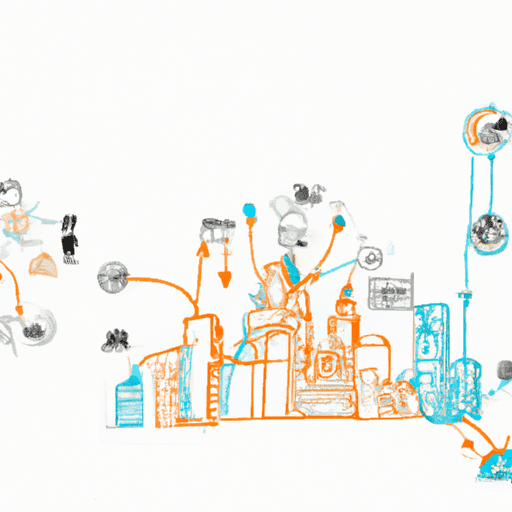So you're scrolling through your social media feed, and you stumble upon an interesting crowdfunding project. You feel a sudden urge to support it, even though you may not fully understand why. This article aims to shed light on the psychology behind why people back crowdfunding projects. By exploring the various factors that influence our decision-making process, we hope to unravel the mysteries behind our willingness to contribute to these ventures. Whether it's the allure of being part of something innovative or the desire for personal connections, understanding these underlying motivations can help us navigate the world of crowdfunding with a clearer perspective.
The Appeal of Crowdfunding Projects
Crowdfunding projects have gained immense popularity in recent years, and it's not hard to see why. The concept of shared investment is a major draw for many individuals. Instead of shouldering the financial burden alone, crowdfunding allows you to contribute a smaller amount alongside other backers. By pooling resources, you become part of something bigger – a collective effort to bring an idea to life. This shared investment not only reduces financial risk but also fosters a sense of community and solidarity among backers.
Furthermore, crowdfunding projects offer a unique opportunity to support innovation and creativity. Whether it's a groundbreaking technology, a captivating film, or a revolutionary product, these projects often represent ventures that might struggle to find funding through traditional means. By backing a crowdfunding campaign, you have the thrill of being an early adopter and directly contributing to the realization of innovative ideas. It's a chance to play a part in the creation of something new and exciting, fueling a sense of excitement and satisfaction.
Factors Influencing Backing Decisions
When it comes to deciding which crowdfunding projects to back, several factors come into play. One key consideration is the perceived value of the project. Backers want to ensure they are investing in something that offers a worthwhile return, whether it be financial, emotional, or both. A well-presented project with a clear value proposition is more likely to attract backers who can see the potential for a positive outcome.
Risk perception and mitigation also play a crucial role. Backers want to feel confident that their investment is not going to be wasted. Transparency from project creators regarding potential risks, challenges, and mitigation strategies can help alleviate concerns and build trust. Additionally, the reputation and track record of the project creator can influence backers' perception of the project's credibility and chances of success.
Social influence and approval are powerful motivators in backing decisions. Backers are often influenced by the actions and recommendations of others when deciding which projects to support. Positive reviews, testimonials, and endorsements from trusted individuals or influencers can sway individuals who may be on the fence. Backers seek validation from others, wanting to align themselves with projects that are socially approved and have a sense of momentum and community support.
Personal attachment and emotional connection are significant drivers of backing decisions. Backers are more likely to support projects that resonate with their values, interests, or personal experiences. When a project aligns with their passions or goals, individuals feel a sense of connection and purpose. Projects that effectively evoke emotions and establish a personal connection have a higher likelihood of attracting backers who feel compelled to support them.
Role of Trust and Credibility
Trust and credibility are essential elements in the crowdfunding landscape. Backers want to feel confident that their investment will be used as intended and that the project creators have genuine intentions. This is where project transparency comes into play. Openly sharing information about project goals, progress updates, and financial plans helps build trust and credibility. Backers appreciate transparency as it gives them insight into the project's development and helps them make informed decisions about whether or not to back it.
Moreover, the reputation of the project creator significantly influences the decision-making process. Backers are more likely to support projects led by creators who have a proven track record or are well-regarded within their industry or community. A project creator with a positive reputation is seen as reliable, competent, and capable of delivering on their promises. Conversely, a lack of credibility can deter potential backers, even if the project itself seems promising.
Investors also closely evaluate the perceived genuineness of a project creator's intentions. Backers are more likely to support projects where creators demonstrate passion, authenticity, and a sincere desire to bring their vision to life. When creators are perceived as genuinely caring about their backers and being committed to their project's success, it builds trust and encourages greater investment.
Scarcity and Exclusivity Effects
Scarcity and exclusivity can have a profound impact on backers' decision-making. Limited availability acts as a psychological trigger, creating a sense of urgency and desire to secure a spot or obtain exclusive access. Backers fear missing out on something unique or special, pushing them to act quickly and back a project before it reaches its funding goal or predetermined deadline. The fear of missing out (FOMO) can drive individuals to take action, even if they might have initially been hesitant.
Creating a sense of exclusivity adds to the appeal of crowdfunding projects. Backers are often enticed by the opportunity to be part of an exclusive group of early adopters or receive limited-edition rewards. Projects that offer tiered reward systems or special perks for early backers tap into this desire for exclusivity. By offering something that is not readily available to others, projects can generate more interest and attract backers who value the exclusivity factor.
Early bird incentives also play a significant role in attracting backers. By offering discounted prices or additional rewards for those who back a project in its early stages, creators create a sense of urgency and reward for early support. This strategy encourages backers to act quickly and increases the chances of reaching the project's funding goal at an accelerated pace.
Social Proof and Herd Mentality
Humans are social creatures, and our actions are often influenced by others. This natural inclination to follow others' actions extends to backing crowdfunding projects. The phenomenon known as social proof suggests that people are more likely to participate in activities or support projects that others have already shown interest in. Backers seek reassurance and validation in the form of positive reviews, testimonials, and social media engagement.
Positive reviews and testimonials from previous backers can significantly influence potential backers. When individuals see others sharing their positive experiences and expressing satisfaction with a project, it increases their trust and confidence in that project. This social validation reinforces a sense of credibility and success, making the project appear more appealing to potential backers.
Fear of missing out (FOMO) can also drive backers to support a project. When individuals see others enthusiastically backing a project, they may worry that they will miss out on a potentially successful investment opportunity or an exciting product or experience. This fear of being left behind can push individuals to join the crowd and back the project to ensure they don't miss out on something they perceive as valuable.
Emotional Gratification and Symbolic Rewards
Backing crowdfunding projects provides individuals with a unique opportunity for emotional gratification. The act of contributing to a project aligns with our innate desire to support others and make a positive impact. Backers derive psychological satisfaction from knowing they have played a role in bringing an idea or a dream to life. This sense of contribution taps into altruistic motives and cultivates a feeling of fulfillment and purpose.
Symbolic rewards play a crucial role in the appeal of backing crowdfunding projects. Backers often value tangible or intangible rewards that reflect their interests, aspirations, or personal identity. Whether it's an exclusive item related to the project, a personalized thank-you message, or recognition on a backers' wall, these rewards serve as a form of self-expression. By obtaining these symbolic rewards, backers can showcase their support for a particular project and publicly align themselves with its values.
Furthermore, backers often form an emotional connection with the goals and objectives of a project. When a project resonates with their values or beliefs, they develop a sense of empathy towards the creator's vision. This emotional connection drives their desire to see the project succeed and helps overcome any hesitation or skepticism they may have. Backers feel personally invested in the project's outcome, making the act of backing a deeply meaningful experience.
Behavioral Economics and Decision-making
Understanding the principles of behavioral economics is essential in comprehending why individuals make specific backing decisions. Anchoring and framing effects play a role in decision-making by influencing how individuals perceive the value and potential of a project. The way a project is presented, the framing of rewards, and the comparison to similar projects can all impact how backers evaluate and ultimately decide to support a project.
Additionally, loss aversion and endowment effect shape decision-making in the realm of crowdfunding. Backers may be more motivated by the fear of missing out on potential gains or the fear of losing their initial investment rather than the potential for significant financial returns. The prospect of a project failing to meet its funding goal and backers losing out on the opportunity to support a potentially successful venture can outweigh the potential gains.
Choice overload and decision fatigue can also play a role in backers' decision-making processes. With the vast array of crowdfunding projects available, individuals may become overwhelmed by the sheer number of options. This overload of choices can lead to decision fatigue, making it challenging to evaluate each project thoroughly. Backers may default to simpler decision-making strategies, such as relying on social proof or backing projects recommended by trusted sources, to alleviate the cognitive burden.
Project Presentation and Communication
The way a crowdfunding project is presented and communicated to potential backers is crucial in attracting support. Clear and compelling project descriptions are essential to provide backers with a comprehensive understanding of the project's goals, benefits, and potential impact. It is vital to articulate the unique selling points and explain the value proposition concisely, engaging both the rational and emotional aspects of potential backers.
Effective use of visuals can significantly enhance a project's appeal. Images, videos, or infographics that demonstrate the concept, prototype, or anticipated outcomes can bring the project to life and capture the attention of potential backers. Storytelling is also a powerful tool in project communication. By weaving a narrative that conveys the vision, challenges, and aspirations behind the project, creators can engage and resonate with backers on a deeper level.
Perceived Benefits and Personal Gain
Backers consider various perceived benefits and potential personal gains when deciding which crowdfunding projects to back. Financial returns and potential profits are often significant drivers for backers, particularly in campaigns offering equity or revenue-sharing opportunities. The promise of a high return on investment can attract backers seeking financial gains or looking to diversify their investment portfolios.
Access to exclusive perks and rewards is another attractive aspect of backing crowdfunding projects. Creators often provide backers with unique experiences, early access to products or services, or limited-edition items as rewards. These exclusive perks add value and make backers feel special, enhancing their motivation to contribute.
Opportunities for personal growth and learning can also be appealing to potential backers. Some projects offer educational opportunities, workshops, or mentorship programs as rewards. Backers may see these opportunities as a chance to acquire new skills, expand their knowledge, or network within a specific industry or community.
Psychological Barriers to Backing
Despite the many incentives and psychological factors that drive individuals to back crowdfunding projects, several psychological barriers can hinder potential backers. Uncertainty and fear of project failure can deter individuals from investing in a project. The inherent risk associated with crowdfunding, where projects may fall short of their goals or not deliver as promised, can make some individuals hesitant to invest their hard-earned money.
Lack of trust in the crowdfunding platform also poses a barrier. Some individuals may be wary of the legitimacy and security of the platform itself, fearing the potential for scams or fraudulent projects. Building trust in the platform's reputation and security measures is crucial in alleviating these concerns and encouraging potential backers to take the plunge.
Skepticism towards project creators' capabilities is another psychological barrier. Backers may question the creator's ability to execute the project successfully or deliver the promised rewards. Lack of credibility, experience, or a track record can make potential backers doubt the viability of the project, leading them to opt-out of backing.
Reluctance to invest in intangible or non-physical products can also hinder backing decisions. Some individuals may prefer to invest in tangible assets or products they can see and touch. Projects that offer digital or virtual products, software, or services may face challenges in attracting backers who are more comfortable investing in physical goods.
In conclusion, the psychology behind backing crowdfunding projects is multifaceted. The appeal lies in shared investment, the thrill of supporting innovation, and being part of something bigger. Factors influencing backing decisions include project value, risk perception, social influence, and emotional connection. Trust and credibility, scarcity, and social proof play significant roles, while emotional gratification and symbolic rewards drive participation. Understanding these psychological factors can help project creators optimize their campaigns and attract the backing needed to turn their ideas into reality.



